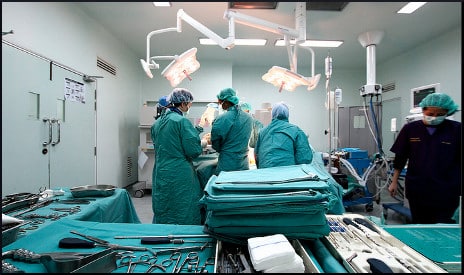 Dr. Pretlow is always focused on treating the underlying cause of obesity, rather than the symptom. As he mentioned in his Huffington Post piece, “Eating Addiction: There’s an App for That,” bariatric surgery is capable of facilitating long-term weight loss for some. But it is expensive, and risky in terms of potential side effects. Worst of all, 20% or perhaps even 30% of patients fail to lose weight, or else they gain it back.
Dr. Pretlow is always focused on treating the underlying cause of obesity, rather than the symptom. As he mentioned in his Huffington Post piece, “Eating Addiction: There’s an App for That,” bariatric surgery is capable of facilitating long-term weight loss for some. But it is expensive, and risky in terms of potential side effects. Worst of all, 20% or perhaps even 30% of patients fail to lose weight, or else they gain it back.
Diabetic patients are likely candidates for bariatric surgery because the importance of regulating their metabolism overrides other considerations. “Sustained diabetes remission” is the desirable outcome for such patients. It can be accomplished for the short term, and probably over the long term as well. For WebMD.com, Robert Preidt described how those who suffer from type 2 diabetes have gained a new lease on life, proven to last as long as nine years.
Of course, no intervention can always work for everyone. Sustained diabetes remission was found to be most attainable by patients who met three criteria: they had diabetes for less than 5 years before the surgery; their surgery was gastric bypass (not adjustable gastric banding); and they actually did maintain weight loss over a period of years.
The difference in effectiveness that resulted from the various types of surgery was apparent because, out of the subject pool of 217 patients, 162 underwent gastric bypass surgery, while 32 had the gastric banding, and 23 had sleeve gastrectomy. Research conducted by the Bariatric and Metabolic Institute of the Cleveland Clinic also showed a widespread, general benefit that affected most of the subjects:
Long-term follow-up showed that patients continued to have improvements in their diabetes, as well as a reduction in risk factors for cardiovascular disease.
About diabetic patients as a whole, lead investigator Dr. Stacy Brethauer finds that only about half of them are really able to optimally control their blood glucose level. But post-bariatric surgery patients, five years later, have an 80% level of control—a considerable improvement, and one that does not dissipate after a short year or two, but seems to stick.
Better yet, again after five years, about one-third of the patients in the study were able to manage their blood glucose without medication. Imagine the relief of not needing to shoot up with insulin anymore!
A New Surgical Weight Loss Method Shows Promise
Toward the end of 2013, the journal Gut published news of a procedure that at that point had only been tried on animals, and is still under development. Scientists from the Universityof Cincinnati and the Helmholtz Zentrum München (aka the German Research Centre for Environmental Health) worked together to develop this approach.
Because bariatric surgery can be very invasive and is often permanent, the goal is to find a method that is minimally invasive and reversible, and to obtain the benefits of current surgical interventions without the drawbacks. Rather than remove a piece of the patient, or sew things together, an extra piece is added to the patient’s interior with the following result:
The placement of a non-permeable tube in the small intestine leads to reduced nutrient absorption and consequently to reduced obesity and enhanced glucose metabolism…
Further studies now aim to clarify which influence this novel surgical technique has on the complex neuroendocrine network that controls energy metabolism.
The flexible device is known as a duodenal-endoluminal sleeve (DES), and it can reduce nutrient absorption in the intestinal lumen and also reduce reactive mucous membrane growth in other intestinal sections. It appears that these actions foster an improved utilization of nutrients. Animal studies showed that, as with bariatric surgery, obesity can be reduced, along with insulin resistance—but the tube is still not ready for human use.
Your responses and feedback are welcome!
Source: “Eating Addiction: There’s an App for That.” HuffingtonPost.com, 09/11/15
Source: “Weight-Loss Surgery & Long-Term Diabetes Control.” WebMD.com, 09/19/13
Source: “Weight loss through the use of intestinal barrier sleeves.” AlphaGalileo.org, 10/10/13
Image by Phalinn Ooi

 FAQs and Media Requests:
FAQs and Media Requests: 











